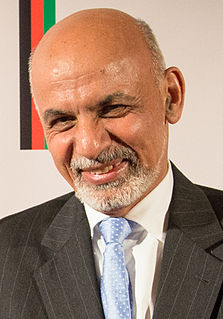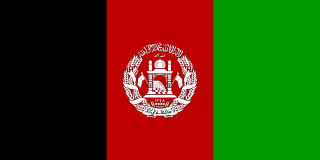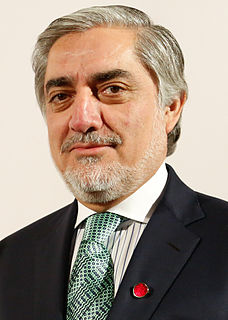
In the Pashtunwali, a code of laws of the Pashtun peoples living in areas of Afghanistan and Pakistan and neighboring countries, loya jirga is a special type of jirga that is mainly organized for choosing a new head of state in case of sudden death, adopting a new constitution, or to settle national or regional issue such as war. It predates modern-day written or fixed laws and is mostly favored by the Pashtun people but to a lesser extent by other nearby groups that have been influenced by Pashtuns.

The politics of Afghanistan consists of the council of ministers, provincial governors and the national assembly, with a president serving as the head of state and commander-in-chief of the Afghan Armed Forces. The nation is currently led by President Ashraf Ghani who is backed by two vice presidents, Abdul Rashid Dostum and Sarwar Danish. In the last decade the politics of Afghanistan have been influenced by NATO countries, particularly the United States, in an effort to stabilise and democratise the country. In 2004, the nation's new constitution was adopted and an executive president was elected. The following year a general election to choose parliamentarians took place.

Hamid Karzai is an Afghan politician who was the President of Afghanistan from 22 December 2001 to 29 September 2014, originally as an interim leader and then as President for almost ten years, from 7 December 2004 to 2014. He comes from a politically active family; Karzai's father, uncle and grandfather were all active in Afghan politics and government. Karzai and his father before him, Abdul Ahad Karzai, were each head of the Popalzai tribe of the Durrani tribal confederation.
The Afghan Constitution Commission was established October 5, 2002 as required by the Bonn Agreement, which stipulated that a new Afghan constitution be adopted by a loya jirga. The loya jirga was required to convene within eighteen months of the establishment of Afghan Transitional Administration, which was established by the Emergency Loya Jirga in June 2002. After some delay, the proposed Afghan Constitution was presented to President Hamid Karzai on November 3, 2003. A loya jirga began December 14, 2003 in Kabul and was endorsed January 4, 2004.

Mohammad Ashraf Ghani Ahmadzai is an Afghan politician and current president of Afghanistan, elected on 21 September 2014. An anthropologist by education, he previously served as finance minister and the chancellor of Kabul University.

The Transitional Islamic State of Afghanistan (TISA), also known as the Afghan Transitional Authority, was the name of a temporary administration of Afghanistan put in place by the loya jirga of June 2002. It succeeded the original Islamic State of Afghanistan and preceded the current Islamic Republic of Afghanistan.

Sibghatullah Mojaddedi was an Afghan politician, who served as the President after the fall of Mohammad Najibullah's government in April 1992. He was also the founder of the Afghan National Liberation Front, and served as the chairman of the 2003 loya jirga that approved Afghanistan's new constitution.
The following lists events that happened during 1994 in Afghanistan.

The Afghan Interim Administration (AIA), also known as the Afghan Interim Authority, was the first administration of Afghanistan after the fall of the Taliban regime and was the highest authority of the country from 22 December 2001 until 13 July 2002.

Abdullah Abdullah is an Afghan politician, serving as Chief Executive of the Islamic Republic of Afghanistan since September 2014. From October 2001 to April 2005, he served as Minister of Foreign Affairs. Prior to that he was a senior member of the Northern Alliance working as an adviser to Ahmad Shah Massoud. He also worked as a medical doctor during the late 1990s.

Shahla Ata was an Afghan politician, congresswoman and one of two female candidates during Afghanistan's 2009 Presidential election. She told DiManno she and her family lived for 18 years in the United States. The Contender Biography published by Pajhwok Afghan News has her living in the United States from 1990 to1 1994, and living in Pakistan for the remainder of the period 1986 to 2001, where she administered relief to other Afghan expatriates.
Mawlana Abdul Qadir Imami Ghori is a citizen of Afghanistan, and a candidate in the 2009 Afghan Presidential elections. He was one of participants at the Bonn Conference in late 2001 that agreed that Hamid Karzai should be the leader of the Afghan Transitional Administration. He was elected to represent Ghor Province, where he was born, in the Wolesi Jirga, the upper house of Afghanistan's national legislature, during the elections in 2005.
Habib Mangal is an Afghan citizen who was a candidate in Afghanistan's 2009 Presidential elections.
Haji Hasan Ali Sultani] is a citizen of Afghanistan who was a candidate in the 2009 Afghan Presidential elections.
Said Jalal Karim is a citizen of Afghanistan who was a candidate in Afghanistan's 2009 Presidential elections.
Motasim Billah Mazhabi is a citizen of Afghanistan who was a candidate in Afghanistan's 2009 Presidential elections.

An emergency loya jirga was held in Kabul, Afghanistan between 11 and 19 June 2002 to elect a transitional administration. The loya jirga was called for by the Bonn Agreement and Bush administration. The agreement was drawn up in December 2001 in Germany. Conducted under United Nations auspices, the talks at Bonn sought a solution to the problem of government in Afghanistan after the US ousted the Taliban government.
Mohammad Nasim Faqiri is an Afghan politician and diplomat. He has served as a longtime spokesman for Jamiat-e Islami in Afghanistan, and was appointed Secretary General of the organization.

Zalmai Rassoul is an Afghan politician who served as Foreign Minister of Afghanistan from January 2010 to October 2013. He previously served as National Security Advisor beginning in June 2002. He has accompanied Afghan President Hamid Karzai on all official visits since the establishment of the Interim Administration in 2001. He resigned as Foreign Minister on 5 October 2013 to stand as a candidate in the 2014 presidential election.

Muhammad Sarwar Danish, is an Afghan politician who has been Vice President of Afghanistan since 2014. He previously served as Acting Minister of Justice from 2004 to 2010 and as Acting Minister of Higher Education from 2010 to 2014. When Daykundi province was carved out of Urozgan province in 2004, Danish became its first Governor.

















